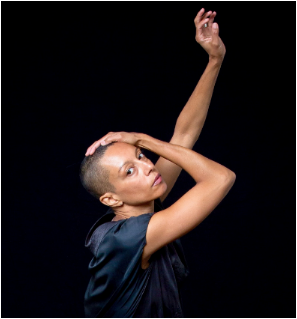 Stefanie Batten Bland Photo: photo by Beowulf Sheehan
Stefanie Batten Bland Photo: photo by Beowulf Sheehan Stefanie Batten Bland and her company, Company SBB premieres the evening-length, interdisciplinary work PATIENT(CE) – a Physical Requiem at Harlem Stage, October 22 – 24. Described as a physical requiem to Batten Bland’s father, the late Ed Bland, a contemporary jazz composer and filmmaker, PATIENT(CE) is made in collaboration with the futuristic jazz ensemble Burnt Sugar The Arkestra Chamber; lighting and visual by Alaric Hahn, additional visuals by Batten Bland, costumes by Deborah Fergueson and eight dancers. Not included in the cast this time around, as a performer, Batten Bland has danced for Bill T. Jones/Arnie Zane Dance Company, Sean Curran Dance Company, Pina Bausch Tanz Theater Wuppertal, Lar Lubovitch, Julie Taymor and currently works for Punch Drunk’s production, Sleep No More in New York City, to name a few. As a choreographer she recently received the 2015 Kevin Spacey Foundation Artists Choice Award for Dance in the US, mounted works on Ailey II, was the lead choreographer at the Paris Opera Comique in France, and has choreographed for directors including Jérome Savary, Van Cleef & Arpels and Louis Vuitton. Batten Bland talked with me about the making of PATIENCE(CE).

Batten Bland: I began in 2011 when I was moving back to New York from France. My dad's film The Cry of Jazz was receiving a lot of attention from BAM’s film anthology and the American Library of Congress. We were also talking about its principles; the structure of jazz music, the trust, the highly attuned nature of the musician’s relationship to the group, understanding improv and getting harmony within a structure. This is something I also do in dance. The idea took some years and the first tinkering was made for Ailey ll in 2012. Once the rights were reverted back to me, I began a year and a half of researching, funding, workshopping and showing. As dance is a social creative experience for me, collaborating is already at its essence.
Charmaine: Why Burnt Sugar…?
Batten Bland: I met them in 2011 also and accidentally found out that many of them revered my father's film… using it in lectures at universities. There seemed an immediate care and profound understanding of my father's statement-- jazz is a closed form without room for advancement, as it was created specifically to illustrate the black person's experience in America. Within that closed format one searches for freedom, hence the sensational qualities that are within jazz, but structurally it never ventures out of a walled format. I think this is a deeper conversation of finding liberty within frustration and gauging that waiting game. Greg [Tate – founder/leader] and his musicians are creating a score that will be ever-changing, celebrating the past and the present, while I look at the present and the future.
Charmaine: There is also visual installation by you and Alaric Hahn. Can you describe what audiences may see?
Batten Bland: I don't want to give it away…but…I wanted to create a structure which we could not exit, yet one that we could manipulate. If I am physicalizing what is musically manifesting, and which in turn is about waiting until the times change, well, then I wanted to be able to change space as that would allow me to sculpt time.
Charmaine: Are the dancers also considered collaborators?
Batten Bland: Always. I only work with collaborators.
Charmaine: How do you come about the movement-language?
Batten Bland: I work with a storyboard (I'm quite cinematic like this). I figure out the arch of the creation and movement is explored in function of what tableau we are trying to tackle.
Charmaine: Of the three parts did any one come first?
Batten Bland: I'd say discussion came first. Discussion of music, American social issues and then debates between music and dance and exploring the similarities and current event, progress or not.
Charmaine: What makes all these elements whole?
Batten Bland: The piece makes it whole. In the end it is always the piece that steers, leads me and tells me when it is done.
Charmaine: Is there anything else you’d like to share with the readers?
Batten Bland: I'm a lucky person to have inherited such a thick and complex identity. I find it amazing that this musical form structurally expresses something so deep and profound. I was amazed how at the end of my father's life, he didn't express regret nor anger towards the disgusting things he was forced to do or be or how long it took (if ever) to reach dignity from the outside frame. Instead, he looked at it all and said what an amazing ride. I think this is the heart of the piece. It is perhaps abstract in a performative nature, but what makes it tick is the grace we have in how we use the "now," the opportunity to live with and appreciate the present tense with one another. I'm a hopeless optimist, I find appreciation, love and joy from within the structure, and thus I am free.
Read and see more here
Visit Harlem Stage here
 RSS Feed
RSS Feed